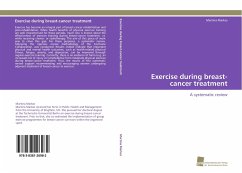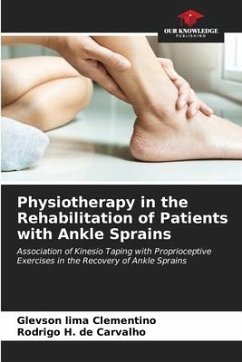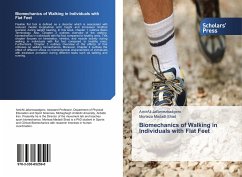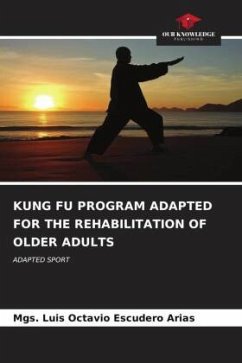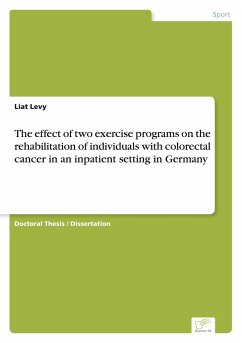
The effect of two exercise programs on the rehabilitation of individuals with colorectal cancer in an inpatient setting in Germany
Versandkostenfrei!
Versandfertig in 1-2 Wochen
74,00 €
inkl. MwSt.

PAYBACK Punkte
0 °P sammeln!
Inhaltsangabe:Abstract: Research in the field of exercise therapy for cancer patients primarily focused on individuals with breast cancer who receive exercise interventions under outpatient conditions. This research study investigated individuals with colorectal cancer under inpatient conditions and aimed to broaden the application of exercise intervention treatments beyond that of breast cancer. The research included two study groups; standard exercise group (SEG, n=44) receiving indoor gymnastic exercise (IGE) and modified exercise group (MEG, n=39) receiving IGE plus additional outdoor walk...
Inhaltsangabe:Abstract: Research in the field of exercise therapy for cancer patients primarily focused on individuals with breast cancer who receive exercise interventions under outpatient conditions. This research study investigated individuals with colorectal cancer under inpatient conditions and aimed to broaden the application of exercise intervention treatments beyond that of breast cancer. The research included two study groups; standard exercise group (SEG, n=44) receiving indoor gymnastic exercise (IGE) and modified exercise group (MEG, n=39) receiving IGE plus additional outdoor walking activity. Participation in the specific exercise therapy program was independent of other therapies received in the inpatient rehabilitation program (IRP). The patients completed QOL questionnaires (QLQ-C30 & QLQ-CR38), psychological distress scale (HADS) and underwent treadmill stress-testing (TST) at the beginning (T1) and upon completion (T2) of the IRP. The QOL and the HADS questionnaires were administrated after a six month follow up (T3) proceeding the IRP completion. Results indicate significant QOL and HADS improvements in pre to post-testing for both study groups. The TST results indicate superior improvements in the MEG in comparison to the SEG. Some of the T1 to T2 QOL and HADS improvement maintained at T3. We conclude that 3 weeks IRP was adequate to reveal improvements in QOL, psychological measures and functional capacity. Future research should emphasize patient motivation for participation in physical activity after completing IRP. This background chapter encompasses the different fields of knowledge which are relevant to the present study, starting with colorectal cancer (epidemiology, etiology, pathology and the International Classification of Functioning, Disability and Health), continuing with the subjects Quality of life, Movement and Sports in the Rehabilitation. The chapter ends with a review of previous physical activity and cancer studies. Descriptive epidemiological knowledge of colorectal cancer is essential for understanding the etiology of the disease and is used in the process of developing screening methods. Large bowel carcinoma is one of the most common cancers in the western world (15% of all cancer cases) and despite advanced diagnostic and therapeutic methods, the prognosis is relatively poor (Faivre et al. 2002). The WHO classification supplies the mortality data of colon cancer separately from rectum cancer. [¿]





